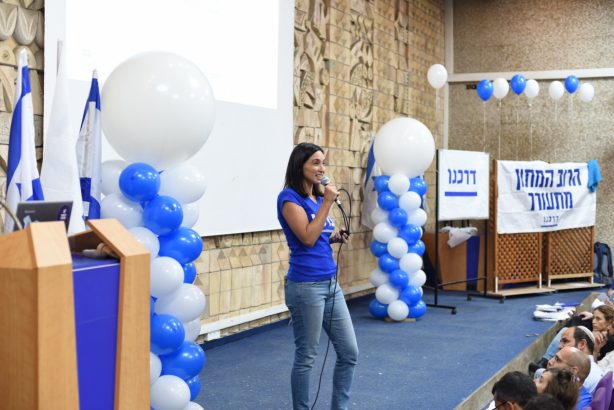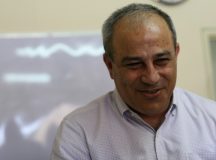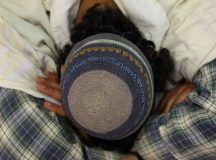Israel has a new organisation. Darkenu styles itself as the movement of Israel’s moderates. It’s leader Polly Bronstein argues that while Israel was created out of nothing, from the collective dream of a persecuted people, the country’s future is now in the balance and its future direction will be determined by the collective action of ‘moderate Israel’. ‘We are the people we have been waiting for,’ she says.
Many people outside Israel tend to see it in black and white. My colourful, beautiful and challenging country is portrayed abroad as either a cruel and violent occupier or as a miracle that made the desert bloom, a courageous nation threatened by enemies that surround it. As a mother of two, I see Israel in shades of grey. Like with a child, one’s love is unconditionally, but you can’t close your eyes to wrongdoing. You are proud of its achievements, yet embarrassed when it misbehaves. But most of all, it’s your responsibility to teach it better, and you never give up trying.
I’m concerned with a phenomenon we are experiencing here in Israel but which is also prominent in the diaspora. I refer to the tendency to believe that, while early Israel was the ‘miracle that made the desert bloom,’ every day since has been a steady slide toward ‘bad,’ dystopian Israel, and that this process is inevitable. It is this cynical, defeatist ‘hand-wringing’ kind of person, both inside and outside Israel, who I address, for ultimately, it is they who will determine our future.
My parents came to Israel from Mexico, as deeply Zionist newly-weds who felt they would never belong there. They needed to raise their family and fulfil their destiny in the young Jewish democracy where they would never be a weak minority. Here, they felt, they could shape their own destiny. My brother and I were raised to be ‘Sabras’ – carry a perfect Hebrew accent, serve in the Israeli army and be a part of the Zionist enterprise. I grew up in Herzliya, optimistic about Israel’s future and sure that I could play a role in helping it succeed. Some time during the early part of this millennium, as pizzerias and buses were exploding and our soldiers were patrolling Palestinian cities and refugee camps, I began to realise that as a daughter of Zionist Jews who suffered anti-Semitism, I have a dual responsibility: ensuring that Israel is safe and secure for the future of the Jewish people, while making sure that this security does not come at the expense of others.
It was within this context that the organisation whose Israeli office I used to lead – OneVoice – was born. OneVoice worked for over a decade to empower the voices of Israeli and Palestinian moderates and to campaign for a two-state solution in both societies, using shared language, common programming and a unified identity. In Israel, we built the Knesset’s very first ‘two-state caucus’ – an All-Party-Parliamentary Group which included MKs from across the spectrum, and which briefly became the biggest caucus in the Knesset before last year’s elections.
OneVoice trained over 10,000 young people – some of whom went on to serve as MKs, or represented Israel in embassies around the world – all of whom got the chance to understand that there was a Palestinian partner on the other side of the Green Line and to work in a meaningful way to promote a peaceful, two-state agenda.
However the world outside OneVoice continued to deteriorate. Whilst pizzerias and buses were no longer being blown up, the diplomatic process had all but died. Hamas and Islamic extremists had strengthened their presence in the West Bank and cemented their hold over Gaza, while settlements had expanded. Some of the most extreme leaders from the settler community moved from the fringes to the centre of Israeli political life.
In December 2014, as Prime Minister Netanyahu called early elections, OneVoice Israel decided to change our strategy. We, the Israeli moderates, felt that history was moving in the wrong direction. We felt that the Israel we grew up in, believed in and fought for was being lost to a tide of extremism, but with an important difference: our own collective apathy and fatalism was part of the problem. We met a group of young activists who felt the same way, and V15 was born.
V15 was a non-partisan, apolitical movement that worked during the 2015 Israeli elections to get the people I just described off their collective asses and to the polls. Americans call this a ‘Get Out the Vote’ programme and it’s a basic component of every US election, from municipalities all the way up to the Presidency. In Israel, however, nothing like this had ever been tried before. We had three months to design and implement the programme, which relied on a simple premise: we wanted to go door-to-door, and have a meaningful conversation with ordinary, moderate Israelis. We knocked on over 250,000 doors, and signed up over 165,000 people. We got 15,000 Israelis to volunteer during the election, knocking on doors, making calls and manning stands across the country. For many, this was their first experience of volunteering. For others, it was their first return to activism since the Rabin years. For all of us, it will remain one of the most important experiences of our lives.
Despite us raising voter turnout everywhere we worked, and bringing an energy and dynamism to the streets that had been absent for a long time, Prime Minister Netanyahu formed the most right-wing coalition in Israel’s history. We at OneVoice Israel were presented with a choice. V15 had become bigger than anything we had ever done, and after just three months of campaigning, it had a bigger profile than OneVoice ever achieved. It had also signed up hundreds of thousands of people, and incorporated 15,000 volunteers. All this capacity and momentum was on one side of the scales. Weighing heavily on the other side was the political reality in Israel: hopes of a two-state solution were fading, racism and violence were on the rise. We knew that what we had built during the election was one of the most important resources that moderate Israel had. But how should we move forward?
Together, our board, volunteers and staff spent last summer forging an identity that fused OneVoice and V15. That meant we would work to end the conflict and achieving two-states but also be concerned about what sort of state Israel would be – one that promotes values of moderation, tolerance, social justice and dignity. It would promote the recognition that being a Jewish Democracy isn’t merely about demography but also values – Israel must become a better democracy for all of its citizens, Jews and non-Jews alike.
Most importantly, we recognised that the old paradigm of left vs. right, or religious vs. secular was destroying Israel, and empowering extremists who used this flawed, binary and reductive approach to set Israeli citizens against one another. Israelis on the sensible, moderate right-wing have much more in common with those on the centre-left than they do with people on the radical right wing fringes, and the equation also works the other way around. There is an Israeli moderate majority that agrees on far more than the self-interested and divisive politicians pretend, and if its members can unite as a ‘civil society bloc’ they can profoundly affect the direction the country takes at this critical moment.
Our Palestinian partners in One Voice came to similar conclusions about what they needed to do in their own society to build support for two-states and fight extremism. Ultimately, there was a recognition that each of us could achieve a greater impact if we worked separately and independently as two distinct movements.
Darkenu means ‘our way,’ but also ‘through us,’ a movement of moderate Israelis who are now waking up. We launched in early 2016, mounting a quietly effective campaign on the Gaza border – a place most of Israel ignores unless a war breaks out – building alliances and signing up 5,000 new supporters who are not from the stereotypical ‘peace camp’ but who, due to where they live, have a greater interest in peace than almost anyone else in the country.
This May however, something happened that galvanised moderate, sensible Israelis and woke them up to what was happening to the country. The response to a soldier putting a bullet in the head of a neutralised terrorist seemed to set off a chain reaction. While some of the Israeli public supported the soldier’s actions, the IDF top brass made a clear moral argument against it. Meanwhile Prime Minister Netanyahu completed a callous political manoeuvre, removing Moshe Yaalon, a former IDF Chief of Staff and a serious, credible Defence Minister and replacing him with Avigdor Lieberman, a man with minimal security experience, and who many see as a racist and genuine danger to Israeli democracy. This series of events reinforced the feeling that we in Israel have reached a critical point, a moment of national destiny. Darkenu asked a simple question to our supporters on billboards around the country: ‘are you awake?’
Over the coming four months, we plan to repeat what we did during the elections, and what nobody else in Israel does. We are going to knock on doors, hundreds of thousands of them, across the whole country – not just in Tel Aviv, but in the Negev, the Galil, and Jerusalem – in the places where people may have traditionally voted for the right, or been sceptical of the ‘peace camp’ but who now recognise that something is going wrong in Israel, and that we moderate, committed Zionists who care deeply about this country have a duty to fix it.
This duty is as binding as our reserve duty in the IDF – a basic condition of living in our own land, in control of our own destiny. By the time Rosh Hashanah arrives, we aim to have added a further 150,000 people to our movement, and to have created something that we haven’t seen in Israel for years; a civic, non-partisan movement that can fight for Israel to make the big decisions on peace, democracy and values.
The country’s future is in the balance. It could go either way, and the direction must be determined by the collective action of ‘moderate Israel’ rather than by the radicals on either side of the debate. Israel was created out of nothing, from the collective dream of a persecuted people. We have proven, time and again, that we can accomplish great things in this land, if only we dare to try. Now is the time to awaken, stand up, unite, and set a course for this country that will ensure its future. We are the people we have been waiting for.





































Beutiful article. Good luck to Darkenu
I like the sentiment and it is true Israeli society needs to change BUT
the idea that there could be a parallel group of any sort of size or power to force change in Palestinian society is fantasy.
This should not stop Darkenu doing what it can to enpower middle of the road moderates – If Darkenu could garner 300.000 votes in an election>>>>>>
Wasn’t this group funded by the US State Department?
This is precisely what Israel needs right now (heck, we may even need it here in the UK…), and very encouraging to hear. Good luck to Polly, to Darkenu, and to rebuilding hope, self-confidence and optimism in Israel.
I quote from BBC Watch “”In a bipartisan report issued Tuesday, the U.S. Senate’s Permanent Subcommittee on Investigations criticized the State Department for issuing $349,000 in grants to OneVoice, an Israeli-Palestinian peace-building organization, with insufficient oversight. The report… found that the funds were used by to build infrastructure that was subsequently turned into an anti-Netanyahu apparatus for Israel’s 2015 elections, in contravention of State Department practice. […]”. So much for being “moderate” accepting funds from abroad in an attempt to overthrow a democratically elected government is not “moderate”. Like Gershon Baskin and others who refuse to face up to the truth, Polly Bronstein is determined to ignore Palestinian extremism, probably at the cost of the lives of her fellow Israelis.
Polly Bronstein’s quest for moderation and goodwill is refreshing and deserves encouragement.
Should Israel lower its defences to foster better rapport with its self-declared enemies? I really wish that I could answer: “Yes”, but as we are seeing in Europe, extremists and terrorists are not persuaded by accommodation or reasonableness to choose inclusiveness over violence.
In summary, whilst we should not close our ears to Ms Bronstein, please do not put in her charge of defending Israel and it citizens.
But Polly you cheated and undermined our legal and political system by trying to oust Bibi. I am no fan of this present government and see myself as a moderate and middle of the road Israeli politically, but to use or take money from the State Department “under the table” to exploit our and to undermine the system is dishonest. This kind of behavior is what makes many of us see anything you do as suspect. Sorry but you too need to be accountable for your actions.